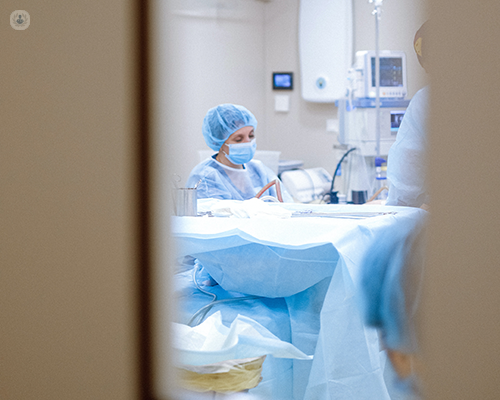How many times can you have a catheter ablation?
Written in association with:Catheter ablation is a minimally invasive surgical procedure that aims to correct short-circuiting in the electrical circuit of the heart. Dr Fu Siong Ng, highly esteemed consultant cardiologist, explains what a catheter ablation (which some patients may refer to as a heart ablation) does, what is the recovery like after the procedure and how many times a catheter ablation can be performed for the same patient.

What is a catheter ablation and what does it do?
Catheter ablation is a common procedure performed for patients with heart rhythm disturbances. Essentially, the word catheter describes the thin and long tube that is inserted into the heart through a small vein in the leg. The word ablation describes the controlled and localised destruction of heart muscle.
The reason why we perform catheter ablation is because patients often have heart rhythm problems that may be fixed if we burn away, freeze away or destroy small bits of heart muscle, to treat the electrical short-circuiting in that patient's heart. It can be done for a number of different conditions, for example atrial fibrillation, supraventricular tachycardia (SVT), atrial flutter and accessory pathways. Many of the problems that cause arrhythmias can be fixed with a catheter ablation procedure.
What is involved in the procedure and how long does it take? Are you awake?
There are different forms of catheter ablation, depending on the specific arrhythmia. The common bit to these procedures is that patients will have little punctures or holes in the leg, where we access the big vein in the leg and pass thin and long spaghetti-shaped tubes called catheters, right up into the heart. Using a guidance system, we can put those catheters in the right place to record the electrical activity of the heart, sometimes to diagnose where the heart rhythm problem is coming from and to treat it (do the ablation), by either burning or freezing little bits of heart muscle to get rid of the short-circuit.
There's a whole range of different durations, depending on the specific type of arrhythmia. It often ranges between two and four hours on average, depending on the simpler arrhythmias. For example, atrial flutter will be quick, but some of the more complex areas like atrial fibrillation and ventricle tachycardia might be on the longer end of the spectrum.
There's a mix of being awake and being asleep. One of the more straightforward conditions is SVT and, in this case, we keep the patient awake and perform the ablation under local anaesthesia. Atrial fibrillation, on the other hand, tends to be performed under general anaesthesia. It's a whole range; catheter ablation may describe the technique, but it also depends on the specific problem you have and the specific problem we need to treat with the ablation.
What are problems or complications you can have during and after a heart ablation procedure?
Catheter ablation is a safe procedure with low risks, but not zero risks. Although complications are uncommon and rare, when I consult a patient, for example, I often tell them whether or not to go forward with the ablation. I always remind them of the unlikelihood of something happening as a result of the procedure.
The complications are also very specific to the type of ablation and the type of arrhythmia that we’re treating. Some procedures maybe carry a one per cent chance of needing a pacemaker, but not all of them will. On general, serious complications are approximately one in 500 catheter ablations, so about 0.2 per cent of individuals who undergo a catheter ablation might suffer a serious complication, like a small heart attack or a small stroke that requires emergency surgery. However, this is very specific to the patient and very specific to the procedure itself. Patients would need to have this discussion with their cardiologist before the procedure.
What is recovery like and what is the average recovery time?
Recovery varies, depending on the specific type of catheter ablation. Normally, when patients ask me how much time they should take off work, I tell them to take one week off work - at the minimum - and then see how they get on.
Catheter ablation is a keyhole procedure and like many of the procedures that are done with local anaesthetic, patients walk out of the hospital the same day. It’s not like having the chest cut open with open heart surgery.
The recovery is shorter because of the nature of this keyhole procedure, but even then, I personally advise to take at least a week off work or at least a week off any exercise and then take it day by day from there on. If patients recover very quickly, they can go back to work after a week and if they’re still not feeling up to it, then they need take a bit more time off.
What is the success rate of catheter ablation?
Catheter ablation describes a generic procedure which depends on the specific arrhythmia that we’re fixing and the individual patient. Some of the most common arrhythmias like SVTs, accessory pathways or atrial flutters, are call it a 90 per cent success rate with a one-off procedure, because in about 10 per cent of patients there might be some recurrence in the future. These are pretty good odds, because it means that the condition is fixed for good in nine out of 10 cases.
Some of the other more difficult arrhythmias to fix, such as atrial fibrillation, have about a 70 per cent success rate with one catheter ablation procedure. We can increase this number to around 80 to 85 per cent with two procedures, but it’s still not quite as good as some of the simple arrhythmias.
But again, it’s all about the specific nature of the arrhythmia, the patient itself, what problems they have and how their heart is functioning. It’s very specific to each individual.
How many times can you have a catheter ablation?
There isn’t a limit on the number of times a patient can have a catheter ablation. A patient can ask for heart ablation surgery as many times as they want. Of course, we wouldn't recommend to keep having a catheter ablation again and again, if it’s not succeeding. On average, we'll probably have - for a specific arrhythmia - two attempts (maybe a third sometimes), but if the patient won’t respond despite a couple of ablations, then the cardiologist will often tell the patient that they can have procedures as they like, but only after asking if this something that they really want to have because they might be taking risks unnecessarily.
Often, around two catheter ablations are the average, but there is no real limit to the number. There will also be some rare occasions when it’s justified to have five or six ablations, but that will be very rare.
Dr Fu Siong Ng is a highly skilled consultant cardiologist based in London with specialism in a variety of heart conditions, including atrial fibrillation, catheter ablation and cardiac device implantations. If you're seeking catheter ablation surgery and would like to know more, make sure to visit Dr Ng’s Top Doctors profile today.


